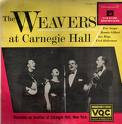

Unfortunately, while listeners were enjoying this folk-tribute to black African music, America was undergoing the "Red Scare." Pete Seeger was labeled a Commie, and "Wimoweh" and The Weavers got blacklisted. It was a revolutionary departure from everything else the Weavers had ever done.His version was faithful to the Zulu original in almost all respects save for his finger-popping rhythm, which was arguably a bit white for some tastes but not entirely offensive.Seeger passed with flying colors, bawling and howling his heart out, tearing up his v ocal cords so badly that by the time he reahed age seventy-five he was almost mute." And then Pete (Seeger) cut looks with all that hollering and screaming. Strings swooped and soared through Solomon's miracle melody. The Weavers were produced by Gordon Jenkins, and Rolling Stone described the result with breathless delight in their issue: Jenkins' "arrangement of "Wimoweh" was a great Vegas-y explosion of big-band raunch that almost equaled the barbaric splendor of the Zulu original. Same deal with one of The Weavers' first hit songs: "Tzena Tzena Tzena." Happily, most everyone who heard "Wimoweh" merely had a jolly excuse to shout "Wimoweh," and not have any idea what it meant.

Thus, leaving things to guys like Idi Amin, or the current maniac tribesmen who allow AIDS, murder, poaching of animals, the stealing of diamonds mass starvation, and spam e-mails from Nigeria. That line, pretty much the translation of "Mbube," meant that one day, the French, Dutch and anyone else inhabiting Africa would go away and stop messing things up. "The lion sleeps" is not musical accompaniment to a Rousseau painting.

Pete Seeger and his friends mis-heard "Mbube" as "Wimoweh." Seeger explains what the word means: "Legend says, Shaka The Lion didn't die when Europeans took over.he simply went to sleep, and he'll wake up some day." Marais & Miranda popularized "Marching to Pretoria," while The Weavers chose "Wimoweh." It was up to "ethnic explorers" to hunt for exotica, be it Delta blues or African chants.ġ952: A breed of white people, called "Folkies," began discovering "world music." Over at Vanguard and Decca, there was The Weavers and the duo of Marais & Miranda, both interested in hipping the world to African music. Of course in South Africa, where blacks could not own property (or copyright) Solomon was doubly cursed.Īn alleged 100,000 copies of "Mbube" sold in Africa over the course of a decade, but the song was too ethnic to make it off the continent and onto national radio stations.

Like so many artists of any color, his record label only paid him for recording the song. Solomon Linda wrote and recorded "Mbube" (a word for "Lion") with his group the Evening Birds. Where.Excedrin users ask, did this musical plague come from? Then turned those tunes into the enduring hit "The Lion Sleeps Tonight."īelow you get a crapload of versions.four MBUBE, four WIMOWEH and enough LION SLEEPS TONIGHT to keep a zoo awake till morning. Give props to Jews and Italians! They made a hit out of "Mbube" an obscure ethnic chant and turned it into "Wimoweh" an irritating musical windshield-wiper of a folk song.


 0 kommentar(er)
0 kommentar(er)
